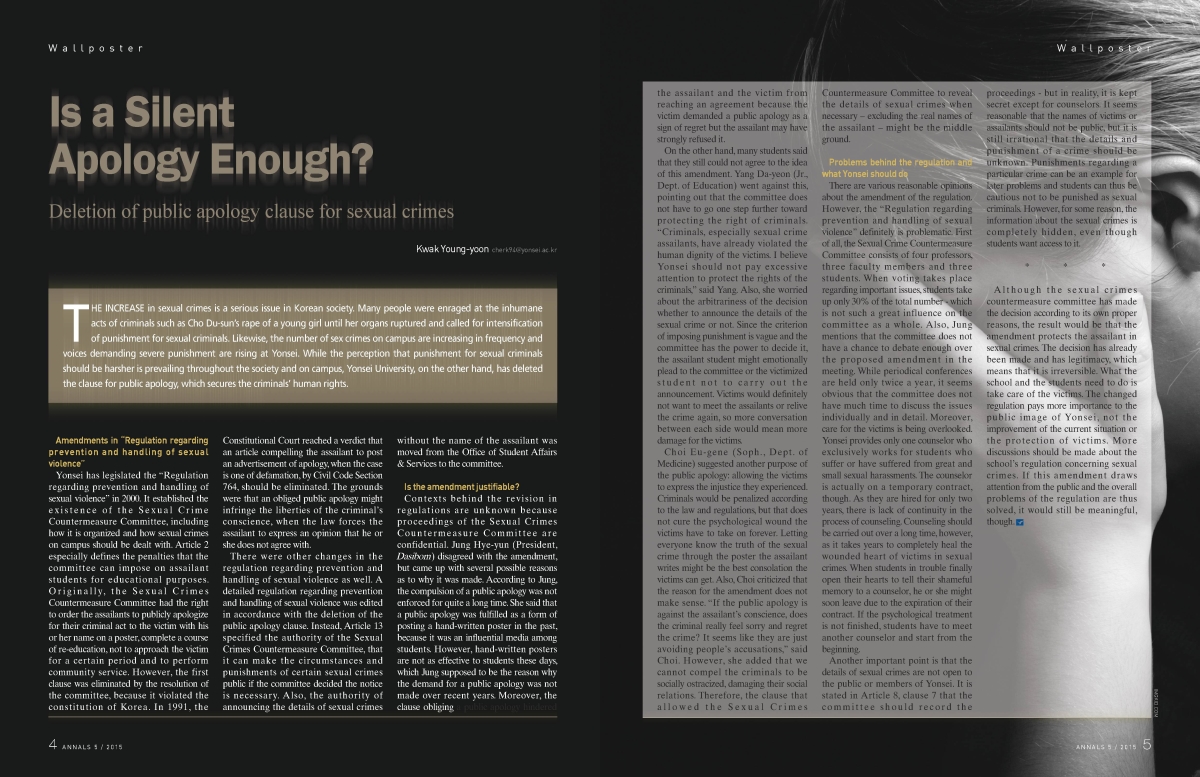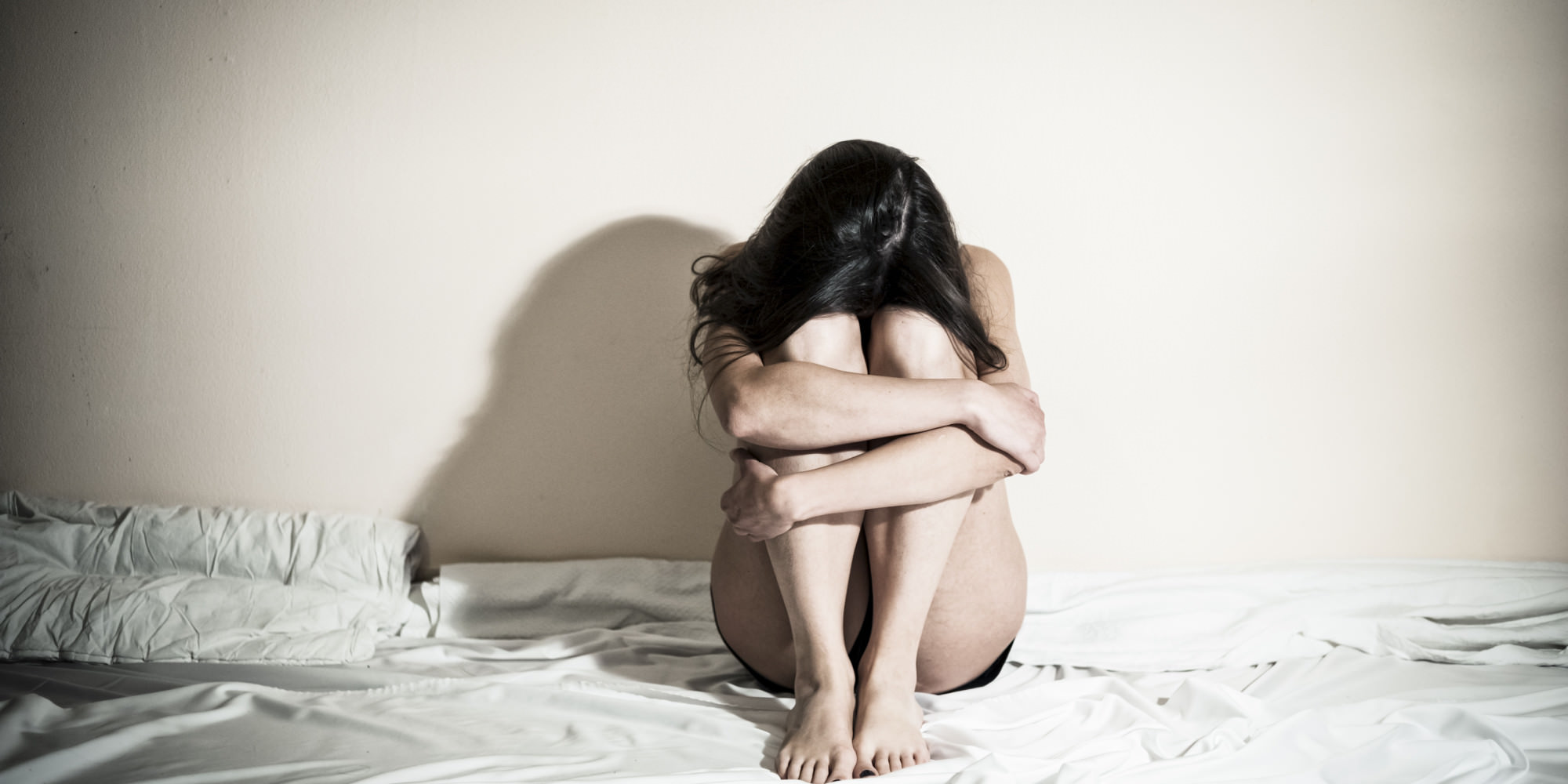Deletion of public apology clause for sexual crimes


THE INCREASE in sexual crimes is a serious issue in Korean society. Many people were enraged at the inhumane acts of criminals such as Cho Du-sun’s rape of a young girl until her organs ruptured and called for intensification of punishment for sexual criminals. Likewise, the number of sex crimes on campus are increasing in frequency and voices demanding severe punishment are rising at Yonsei. While the perception that punishment for sexual criminals should be harsher is prevailing throughout the society and on campus, Yonsei University, on the other hand, has deleted the clause for public apology, which secures the criminals’ human rights.
Amendments in “Regulation regarding prevention and handling of sexual violence”
Yonsei has legislated the “Regulation regarding prevention and handling of sexual violence” in 2000. It established the existence of the Sexual Crime Countermeasure Committee, including how it is organized and how sexual crimes on campus should be dealt with. Article 2 especially defines the penalties that the committee can impose on assailant students for educational purposes. Originally, the Sexual Crimes Countermeasure Committee had the right to order the assailants to publicly apologize for their criminal act to the victim with his or her name on a poster, complete a course of re-education, not to approach the victim for a certain period and to perform community service. However, the first clause was eliminated by the resolution of the committee, because it violated the constitution of Korea. In 1991, the Constitutional Court reached a verdict that an article compelling the assailant to post an advertisement of apology, when the case is one of defamation, by Civil Code Section 764, should be eliminated. The grounds were that an obliged public apology might infringe the liberties of the criminal’s conscience, when the law forces the assailant to express an opinion that he or she does not agree with.
There were other changes in the regulation regarding prevention and handling of sexual violence as well. A detailed regulation regarding prevention and handling of sexual violence was edited in accordance with the deletion of the public apology clause. Instead, Article 13 specified the authority of the Sexual Crimes Countermeasure Committee, that it can make the circumstances and punishments of certain sexual crimes public if the committee decided the notice is necessary. Also, the authority of announcing the details of sexual crimes without the name of the assailant was moved from the Office of Student Affairs & Services to the committee.
Is the amendment justifiable?
Contexts behind the revision in regulations are unknown because proceedings of the Sexual Crimes Countermeasure Committee are confidential. Jung Hye-yun (President, Dasibom) disagreed with the amendment, but came up with several possible reasons as to why it was made. According to Jung, the compulsion of a public apology was not enforced for quite a long time. She said that a public apology was fulfilled as a form of posting a hand-written poster in the past, because it was an influential media among students. However, hand-written posters are not as effective to students these days, which Jung supposed to be the reason why the demand for a public apology was not made over recent years. Moreover, the clause obliging a public apology hindered the assailant and the victim from reaching an agreement because the victim demanded a public apology as a sign of regret but the assailant may have strongly refused it.
On the other hand, many students said that they still could not agree to the idea of this amendment. Yang Da-yeon (Jr., Dept. of Education) went against this, pointing out that the committee does not have to go one step further toward protecting the right of criminals. “Criminals, especially sexual crime assailants, have already violated the human dignity of the victims. I believe Yonsei should not pay excessive attention to protect the rights of the criminals,” said Yang. Also, she worried about the arbitrariness of the decision whether to announce the details of the sexual crime or not. Since the criterion of imposing punishment is vague and the committee has the power to decide it, the assailant student might emotionally plead to the committee or the victimized student not to carry out the announcement. Victims would definitely not want to meet the assailants or relive the crime again, so more conversation between each side would mean more damage for the victims.
Choi Eu-gene (Soph., Dept. of Medicine) suggested another purpose of the public apology: allowing the victims to express the injustice they experienced. Criminals would be penalized according to the law and regulations, but that does not cure the psychological wound the victims have to take on forever. Letting everyone know the truth of the sexual crime through the poster the assailant writes might be the best consolation the victims can get. Also, Choi criticized that the reason for the amendment does not make sense. “If the public apology is against the assailant’s conscience, does the criminal really feel sorry and regret the crime? It seems like they are just avoiding people’s accusations,” said Choi. However, she added that we cannot compel the criminals to be socially ostracized, damaging their social relations. Therefore, the clause that allowed the Sexual crimes countermeasure committee to reveal the details of sexual crimes when necessary – excluding the real names of the assailant – might be the middle ground.
Problems behind the regulation and what Yonsei should do
There are various reasonable opinions about the amendment of the regulation. However, the “Regulation regarding prevention and handling of sexual violence” definitely is problematic. First of all, the Sexual Crime Countermeasure Committee consists of four professors, three faculty members and three students. When voting takes place regarding important issues, students take up only 30% of the total number - which is not such a great influence on the committee as a whole. Also, Jung mentions that the committee does not have a chance to debate enough over the proposed amendment in the meeting. While periodical conferences are held only twice a year, it seems obvious that the committee does not have much time to discuss the issues individually and in detail. Moreover, care for the victims is being overlooked. Yonsei provides only one counselor who exclusively works for students who suffer or have suffered from great and small sexual harassments. The counselor is actually on a temporary contract, though. As they are hired for only two years, there is lack of continuity in the process of counseling. Counseling should be carried out over a long time, however, as it takes years to completely heal the wounded heart of victims in sexual crimes. When students in trouble finally open their hearts to tell their shameful memory to a counselor, he or she might soon leave due to the expiration of their contract. If the psychological treatment is not finished, students have to meet another counselor and start from the beginning.
Another important point is that the details of sexual crimes are not open to the public or members of Yonsei. It is stated in Article eight, clause seven that the committee should record the proceedings - but in reality, it is kept secret except for counselors. It seems reasonable that the names of victims or assailants should not be public, but it is still irrational that the details and punishment of a crime should be unknown. Punishments regarding a particular crime can be an example for later problems and students can thus be cautious not to be punished as sexual criminals. However, for some reason, the information about the sexual crimes is completely hidden, even though students want access to it.
* * *
Although the sexual crimes countermeasure committee has made the decision according to its own proper reasons, the result would be that the amendment protects the assailant in sexual crimes. The decision has already been made and has legitimacy, which means that it is irreversible. What the school and the students need to do is take care of the victims. The changed regulation pays more importance to the public image of Yonsei, not the improvement of the current situation or the protection of victims. More discussions should be made about the school’s regulation concerning sexual crimes. If this amendment draws attention from the public and the overall problems of the regulation are thus solved, it would still be meaningful, though.
Kwak Young-yoon
cherk94@yonsei.ac.kr

